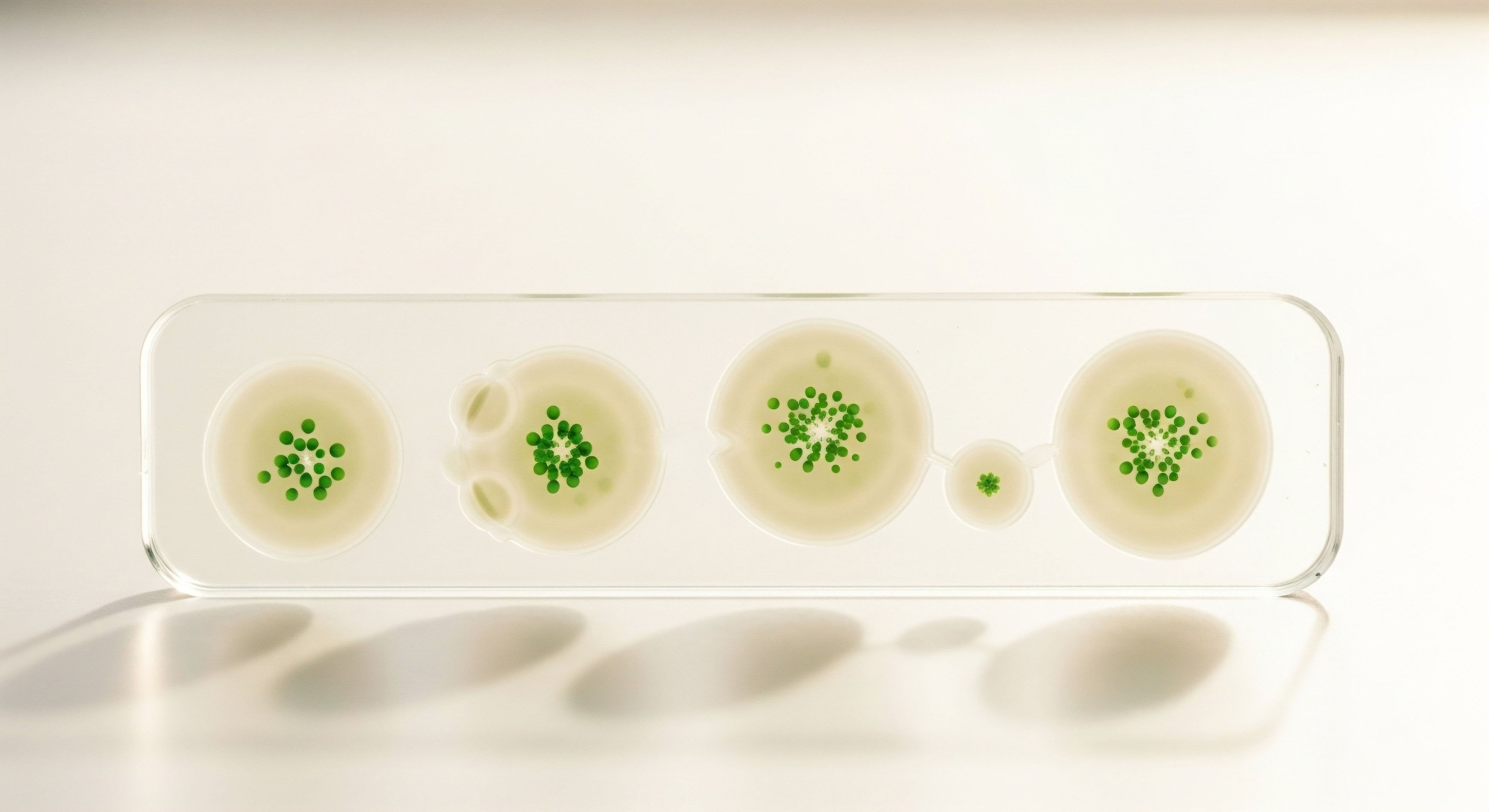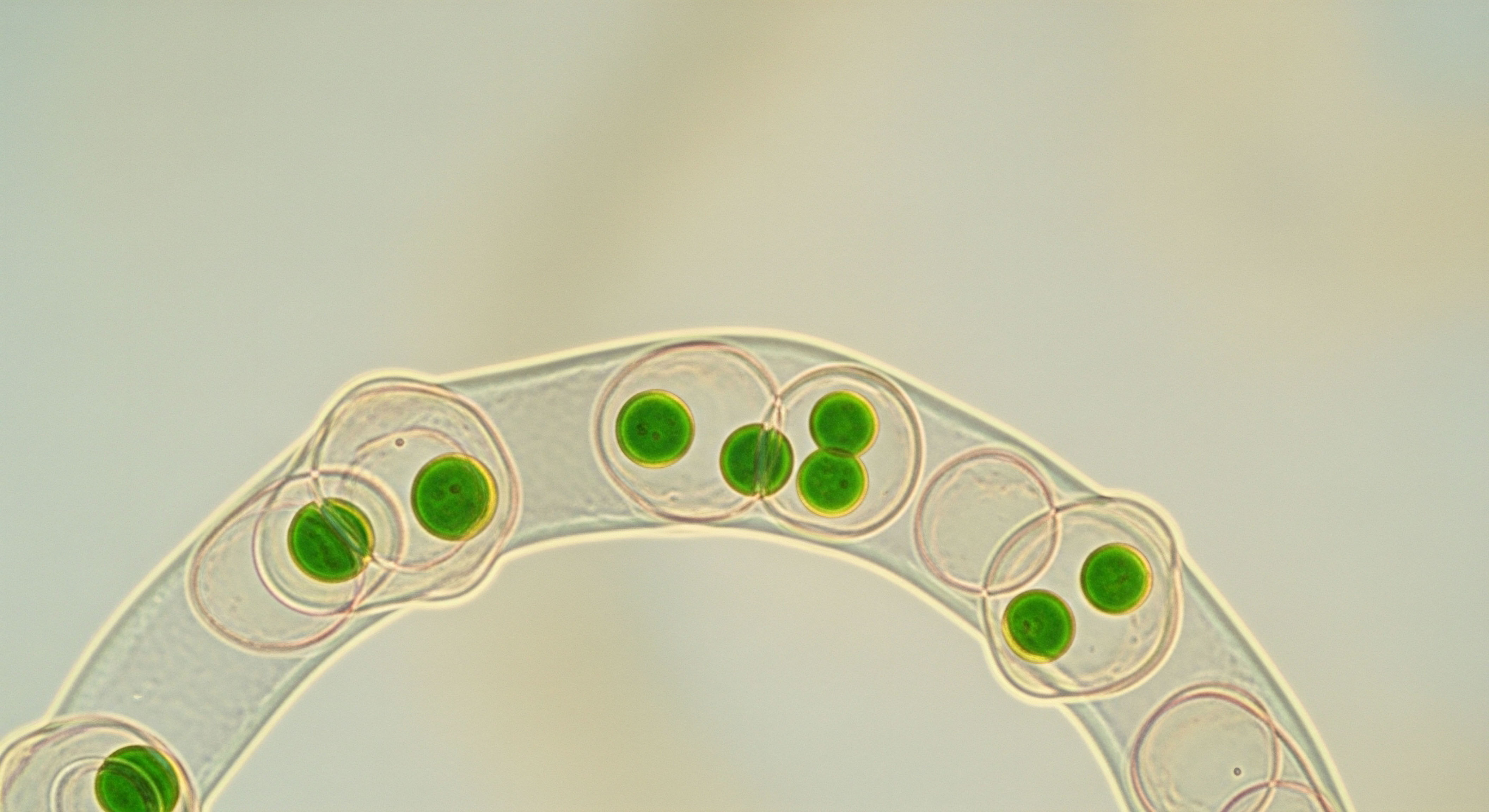

Understanding Your Biological Symphony
The pursuit of vitality, the deep-seated desire to recover with resilience, often leads us to explore the intricate mechanisms governing our physiological well-being. Many individuals, experiencing persistent fatigue, slow recuperation, or subtle shifts in body composition, recognize a fundamental disharmony within their internal systems.
These sensations are not simply transient annoyances; they represent meaningful signals from your endocrine system, indicating areas where deeper understanding and support can restore optimal function. Our focus here centers on the remarkable capacity of the human body to heal and regenerate, a process significantly influenced by signaling molecules known as peptides.
Peptides, short chains of amino acids, serve as sophisticated messengers within the body, orchestrating a myriad of cellular functions. Among these, growth hormone-releasing peptides (GHRPs) and growth hormone-releasing hormones (GHRHs) hold particular significance for recovery, stimulating the pituitary gland to produce and secrete endogenous growth hormone (GH).
This endogenous production is a finely tuned process, deeply intertwined with lifestyle choices. Imagine your body as a magnificent orchestra, where peptides act as conductors, guiding various sections to play in concert. The effectiveness of their performance, however, hinges on the readiness of the musicians ∞ your biological systems ∞ to respond. Lifestyle factors serve as the foundational rhythm and harmony, directly influencing the responsiveness and overall impact of these peptide signals.
Your body’s recovery capacity is a symphony, with peptides conducting and lifestyle factors providing the essential rhythm and harmony.

The Endocrine System and Recovery’s Foundation
The endocrine system, a complex network of glands and hormones, forms the core of this internal orchestration. It regulates virtually every physiological process, from metabolism and growth to mood and sleep. Hormones, including growth hormone, operate within delicate feedback loops, maintaining a dynamic equilibrium essential for health.
When this balance is disrupted, recovery falters, and symptoms manifest. Growth hormone, a polypeptide hormone secreted by the anterior pituitary, plays a pivotal role in tissue repair, muscle protein synthesis, fat metabolism, and overall cellular regeneration. Its pulsatile release, particularly during deep sleep, underscores its importance for restorative processes.
Supporting your endocrine system’s inherent intelligence allows for a more profound and sustained response to therapeutic interventions. Peptides, by gently nudging these natural pathways, work synergistically with the body’s intrinsic healing capabilities. The ultimate goal involves recalibrating your biochemical landscape, enabling your systems to function with renewed vigor and precision. This approach honors the individual’s unique biological blueprint, moving beyond superficial symptom management to address the underlying physiological drivers of well-being.


Optimizing Peptide Efficacy through Daily Rhythms
For those familiar with the foundational role of peptides in stimulating growth hormone, the subsequent question naturally arises ∞ how do we maximize their therapeutic potential? The answer lies in a deliberate, integrated approach to daily living, recognizing that exogenous peptide administration functions most effectively within a supportive endogenous environment.
Lifestyle factors do not merely complement peptide therapy; they act as essential modulators, directly influencing receptor sensitivity, hormonal crosstalk, and overall metabolic responsiveness. This section delves into the specific clinical protocols and physiological mechanisms through which everyday choices can profoundly enhance peptide effectiveness for recovery.

The Deep Connection between Sleep and Growth Hormone Release
Sleep stands as a cornerstone of recovery, fundamentally intertwined with growth hormone secretion. The majority of daily GH release occurs during slow-wave sleep (SWS), the deepest stage of non-REM sleep. This nocturnal surge of GH is critical for tissue repair, cellular regeneration, and metabolic regulation.
Peptides like Ipamorelin and CJC-1295, which stimulate GH release, function optimally when the body’s natural sleep architecture is robust. Chronic sleep deprivation, a pervasive modern challenge, significantly suppresses endogenous GH secretion, potentially blunting the effectiveness of peptide interventions.
Restorative sleep directly amplifies the body’s natural growth hormone rhythms, making peptide therapies more effective.
Optimizing sleep involves more than simply allocating hours; it encompasses cultivating a consistent circadian rhythm. Regular bedtimes and wake times, minimizing exposure to blue light in the evenings, and creating a conducive sleep environment all contribute to a more profound and restorative sleep cycle. When sleep is consistently prioritized, the body’s pituitary gland is better primed to respond to the stimulatory signals of peptides, translating into enhanced recovery outcomes.

Enhancing Sleep for Peptide Responsiveness
- Circadian Consistency ∞ Maintain a regular sleep-wake schedule, even on weekends, to synchronize your body’s internal clock.
- Evening Routine ∞ Implement a calming pre-sleep ritual, avoiding stimulating activities and electronic screens an hour before bed.
- Sleep Environment ∞ Ensure your bedroom is dark, quiet, and cool, promoting uninterrupted slow-wave sleep.

Movement, Metabolism, and Peptide Synergy
Physical activity serves as a potent physiological stimulus for growth hormone release. Both high-intensity interval training (HIIT) and resistance exercise acutely increase GH secretion, with a linear relationship observed between exercise intensity and the magnitude of GH release.
Engaging in regular, structured exercise enhances metabolic function, improves insulin sensitivity, and contributes to a healthier body composition ∞ all factors that create a more receptive environment for peptides. When the body’s metabolic pathways are efficient, the downstream effects of GH, such as lipolysis and muscle protein synthesis, are amplified.
The interplay between exercise and peptides extends to recovery. Peptides like CJC-1295 and Ipamorelin support muscle growth and fat loss, which are directly benefited by consistent training. Exercise also influences inflammatory pathways, and peptides like Pentadeca Arginate (PDA) specifically target tissue repair and inflammation, creating a powerful synergy for accelerated recuperation.
| Lifestyle Factor | Physiological Impact on GH | Mechanism of Enhancement |
|---|---|---|
| Quality Sleep | Increases pulsatile GH release, especially during slow-wave sleep. | Primes pituitary gland for peptide stimulation; optimizes GH’s restorative functions. |
| Regular Exercise | Acutely stimulates GH release; improves metabolic health. | Enhances muscle anabolism and fat utilization; increases tissue responsiveness to GH. |
| Balanced Nutrition | Regulates insulin sensitivity; reduces visceral adiposity. | Minimizes GH suppression from high insulin; supports overall endocrine function. |
| Stress Management | Lowers cortisol, preventing GH inhibition. | Maintains favorable hormonal milieu for GH action; reduces catabolic states. |

Nutrition’s Role in Endocrine Responsiveness
Dietary choices exert a profound influence on the endocrine system and, consequently, on peptide efficacy. High sugar intake leads to elevated insulin levels, which can suppress endogenous GH secretion. A diet rich in refined carbohydrates and sugars creates a metabolic state less conducive to optimal GH function, potentially diminishing the impact of GH-stimulating peptides.
Conversely, a balanced nutritional approach, emphasizing whole foods, lean proteins, healthy fats, and complex carbohydrates, supports stable blood glucose and insulin levels, fostering a more responsive endocrine environment.
Maintaining a healthy body composition, particularly reducing visceral fat, directly correlates with improved GH production and sensitivity. Visceral adiposity can impair GH secretion, suggesting that body fat reduction through dietary modification and exercise can significantly enhance the body’s natural GH axis, thereby augmenting peptide benefits. Personalized nutrition protocols, tailored to individual metabolic needs, become a powerful ally in this journey toward reclaiming vitality.


Chronobiological Synchronization and Receptor Upregulation
A sophisticated understanding of peptide effectiveness necessitates a deeper exploration into the chronobiological underpinnings of endocrine function and the molecular mechanisms governing receptor dynamics. The body’s intricate signaling pathways operate not in isolation, but within a finely tuned temporal framework, a concept known as chronobiology.
Exogenous peptides, particularly growth hormone secretagogues (GHSs), function as potent modulators of the somatotropic axis. Their ultimate impact on recovery is profoundly shaped by the degree to which lifestyle factors synchronize with and optimize these inherent biological rhythms, along with their capacity to influence cellular receptor expression.

The Hypothalamic-Pituitary-Somatotropic Axis ∞ A Temporal Perspective
The Hypothalamic-Pituitary-Somatotropic (HPS) axis orchestrates growth hormone release, a process characterized by pulsatile secretion, with peak amplitudes occurring predominantly during the initial hours of deep sleep. Growth hormone-releasing hormone (GHRH) from the hypothalamus stimulates somatotrophs in the anterior pituitary, while somatostatin exerts inhibitory control.
GHSs, such as Ipamorelin, mimic ghrelin, binding to the growth hormone secretagogue receptor (GHSR-1a) on pituitary somatotrophs, promoting GH release. CJC-1295, a GHRH analog, extends the half-life of GHRH, providing a sustained stimulatory signal. The efficacy of these peptides hinges upon the inherent responsiveness of the somatotrophs, which is dynamically regulated by endogenous factors and, critically, by lifestyle.
Lifestyle factors can fine-tune the body’s internal clock, optimizing the timing and strength of peptide-induced growth hormone pulses.
Disruptions to circadian rhythms, frequently encountered through irregular sleep patterns or shift work, can desynchronize the HPS axis, attenuating the natural nocturnal GH surge. This desynchronization renders the pituitary less receptive to both endogenous GHRH and exogenous GHSs, thereby diminishing the therapeutic yield of peptide administration. Chrononutrition, involving nutrient timing strategies, and structured light exposure protocols can help re-entrain these rhythms, fostering an environment where peptide signals resonate with greater physiological impact.

Molecular Mechanisms of Lifestyle-Mediated Receptor Modulation
Beyond temporal synchronization, lifestyle factors can influence the expression and sensitivity of growth hormone receptors (GHR) and GHSR-1a at the cellular level.
- Exercise-Induced Receptor Upregulation ∞ Regular physical activity, particularly resistance training, increases the density and sensitivity of GHR in target tissues such as skeletal muscle. This upregulation enhances the downstream anabolic signaling of GH, facilitating protein synthesis and tissue repair, even with a given level of circulating GH. Peptides like BPC-157, while primarily known for tissue repair, may also indirectly contribute by improving cellular healing, which can support receptor integrity and function.
- Nutritional Influence on Receptor Sensitivity ∞ Chronic hyperinsulinemia, often a consequence of diets rich in refined carbohydrates, can induce a state of insulin resistance that also impacts GHR signaling. High insulin levels can suppress hepatic GH production and increase IGFBP-1, altering IGF-1 bioavailability. Conversely, dietary patterns that promote insulin sensitivity, such as those low in glycemic load and rich in micronutrients, optimize the entire GH-IGF-1 axis, rendering cells more responsive to GH and peptide-induced GH surges.
- Sleep and Transcriptional Regulation ∞ Deep sleep is a period of heightened transcriptional activity for genes involved in repair and growth. Disrupted sleep can alter gene expression patterns, potentially downregulating components of the GH signaling pathway. Peptides that improve sleep architecture, such as Ipamorelin, indirectly contribute to a more favorable transcriptional landscape, enhancing the body’s capacity to synthesize proteins and repair tissues.

Metabolic Crosstalk and Hormonal Orchestration
The efficacy of peptides extends beyond direct pituitary stimulation, influencing broader metabolic pathways that are intricately linked to recovery. Visceral adiposity, characterized by excess fat around internal organs, is associated with a blunted GH secretory profile and increased systemic inflammation. This metabolic dysregulation creates a suboptimal milieu for tissue regeneration. Interventions targeting body composition, such as consistent exercise and a nutrient-dense diet, reduce visceral fat, thereby improving endogenous GH secretion and enhancing the body’s overall anabolic drive.
The intricate crosstalk between GH, insulin, and IGF-1 defines the anabolic-catabolic balance. While GH directly promotes lipolysis, it can also induce a state of insulin resistance, particularly at higher pharmacological doses. The judicious use of GH-stimulating peptides, coupled with lifestyle strategies that maintain insulin sensitivity, mitigates this potential diabetogenic effect.
This includes strategic carbohydrate timing around exercise and ensuring adequate protein intake to support muscle anabolism without excessive insulin spikes. Understanding these complex interdependencies allows for a truly personalized wellness protocol, where peptides act as powerful tools within a meticulously managed physiological system.
The integration of these advanced insights into lifestyle management transforms peptide therapy from a mere intervention into a finely tuned instrument for biological recalibration. It underscores the profound truth that our daily habits are not peripheral considerations, but central determinants of our physiological potential.

References
- Sigalos, John T. and Andrew G. Pastuszak. “The Safety and Efficacy of Growth Hormone Secretagogues.” Sexual Medicine Reviews, vol. 7, no. 1, 2019, pp. 58-66.
- Bowers, C. Y. et al. “Structure-activity relationships of a synthetic pentapeptide that specifically releases growth hormone in vitro.” Endocrinology, vol. 106, no. 3, 1980, pp. 694-701.
- Copinschi, Georges, et al. “Impact of growth hormone replacement therapy on sleep in adult patients with growth hormone deficiency of pituitary origin.” European Journal of Endocrinology, vol. 169, no. 4, 2013, pp. 437-443.
- Obal, Ferenc, and James M. Krueger. “GHRH and sleep.” Sleep Medicine Reviews, vol. 8, no. 5, 2004, pp. 367-377.
- Frystyk, Jan. “The role of the growth hormone/insulin-like growth factor system in visceral adiposity.” Growth Hormone & IGF Research, vol. 20, no. 4, 2010, pp. 245-251.
- Johannsson, Gudmundur, et al. “Growth hormone treatment reduces abdominal visceral fat in postmenopausal women with abdominal obesity ∞ a 12-month placebo-controlled trial.” The Journal of Clinical Endocrinology & Metabolism, vol. 89, no. 5, 2004, pp. 2197-2204.
- Botella, J. et al. “Pilot study ∞ an acute bout of high intensity interval exercise increases 12.5 h GH secretion.” Physiological Reports, vol. 6, no. 2, 2018, pp. e13570.
- Yuen, Kevin C. J. and George A. R. Phipps. “Effects of growth hormone on glucose metabolism and insulin resistance in human.” Endocrine Reviews, vol. 38, no. 5, 2017, pp. 410-432.
- Martin, R. J. et al. “Growth hormone treatment reduces total body fat accumulation in Zucker obese rats.” International Journal of Obesity, vol. 13, no. 3, 1989, pp. 327-335.
- Scacchi, M. A. I. Pincelli, and F. Cavagnini. “Growth hormone in obesity.” International Journal of Obesity and Related Metabolic Disorders, vol. 23, no. 3, 1999, pp. 260-271.
- Sikiric, Predrag, et al. “Stable gastric pentadecapeptide BPC 157 in trials for inflammatory bowel disease (IBD) ∞ phase II results.” Current Pharmaceutical Design, vol. 24, no. 19, 2018, pp. 2167-2178.

Reclaiming Your Personal Health Trajectory
Understanding the intricate dance between lifestyle and peptide efficacy represents a significant step toward reclaiming agency over your health. This knowledge is not merely academic; it serves as a profound catalyst for introspection, inviting you to consider the nuanced interplay of your daily habits with your deepest physiological processes.
Your journey toward optimal recovery and sustained vitality is a deeply personal endeavor, one that thrives on informed choices and a continuous dialogue with your own biological systems. Recognize that this comprehensive understanding forms the initial stride on a path that often benefits from the guidance of a skilled clinical partner, someone who can translate these principles into a tailored protocol.
Envision a future where your biological systems operate with uncompromised function, a state achievable through deliberate, evidence-based self-stewardship.



